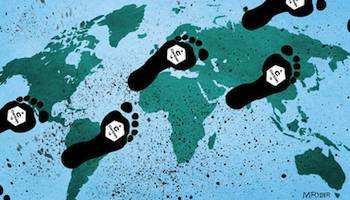- MENU
- HOME
- SEARCH
- WORLD
- MAIN
- AFRICA
- ASIA
- BALKANS
- EUROPE
- LATIN AMERICA
- MIDDLE EAST
- United Kingdom
- United States
- Argentina
- Australia
- Austria
- Benelux
- Brazil
- Canada
- China
- France
- Germany
- Greece
- Hungary
- India
- Indonesia
- Ireland
- Israel
- Italy
- Japan
- Korea
- Mexico
- New Zealand
- Pakistan
- Philippines
- Poland
- Russia
- South Africa
- Spain
- Taiwan
- Turkey
- USA
- BUSINESS
- WEALTH
- STOCKS
- TECH
- HEALTH
- LIFESTYLE
- ENTERTAINMENT
- SPORTS
- RSS
- iHaveNet.com
Kent Garber

Shortly before
The announcement of the deal set off a media stampede in the Bella Center, with hundreds of reporters and photographers racing down the hallway to a press conference with EU officials, only to find the conference had been postponed. The leaders, it seemed, had decided to return to another round of talks, presumably to tweak their new deal.
After a day of negotiations in which world leaders struggled on even the most basic issues, the apparent breakthrough suggests that they had found new willpower--or were simply afraid not to leave Copenhagen empty handed.
According to officials, the agreement, dubbed the Copenhagen Accord, is not legally binding. For it to gain that status, leaders will have to reconvene and negotiate details at a later date.
But within an hour and a half of the deal's announcement, Sudan's Lumumba Stanislaus Di-Aping, who represents the developing countries group, refuted those claims, saying, "The deal remains an idea" and indicated that many countries in his group would not support it.
Details are spotty and will probably continue to trickle out as the night goes on. But among other things, leaders appear to have agreed to keep global temperatures from rising more than 2 degrees Celsius in coming decades and to set guidelines by which countries, including China, would monitor and report those emissions. Those guidelines, of course, have yet to be written, giving both sides a victory: President Obama gets a commitment from China to agree to do more on this front, while China avoids being tied down to a specific plan.
In a press conference, Obama acknowledged that the agreement was not legally binding, a disappointment to many of the countries here, but said it was an important and necessary first step. "It is not enough just for the developed countries to have to make changes," he said. "The developing countries are going to have to make changes as well."
He said that developing countries trying to avoid emission reductions was "not fair" to the developed world.
The deal was apparently hammered out by only a handful of participants, including the United States, the EU, China, India, and Brazil, and therefore awaits approval from the rest of the countries in attendance.
It faces stiff resistance, as Di-Aping suggested. Earlier in the day, representatives from many smaller countries decried the private negotiating sessions that have been going on between the United States and other major emitters, saying that they were being excluded from the process. It is those same countries that have been most disappointed by what they call weak proposals from the developed world.
Obama acknowledged as much, calling the deal "an important first step" but saying that "the science indicates we are going to have to take more aggressive steps in the future."
But Di-Aping's rhetoric suggests that the deal, far from being conciliatory, has only stoked more anger. Early Saturday morning, he said the deal committed "gross violence" against poor countries. He added: "President Obama, in acting the way he did, definitely eliminated any difference between him and the
Di-Aping said he has yet to receive the actual text of the deal. It will presumably come up for a vote Saturday.